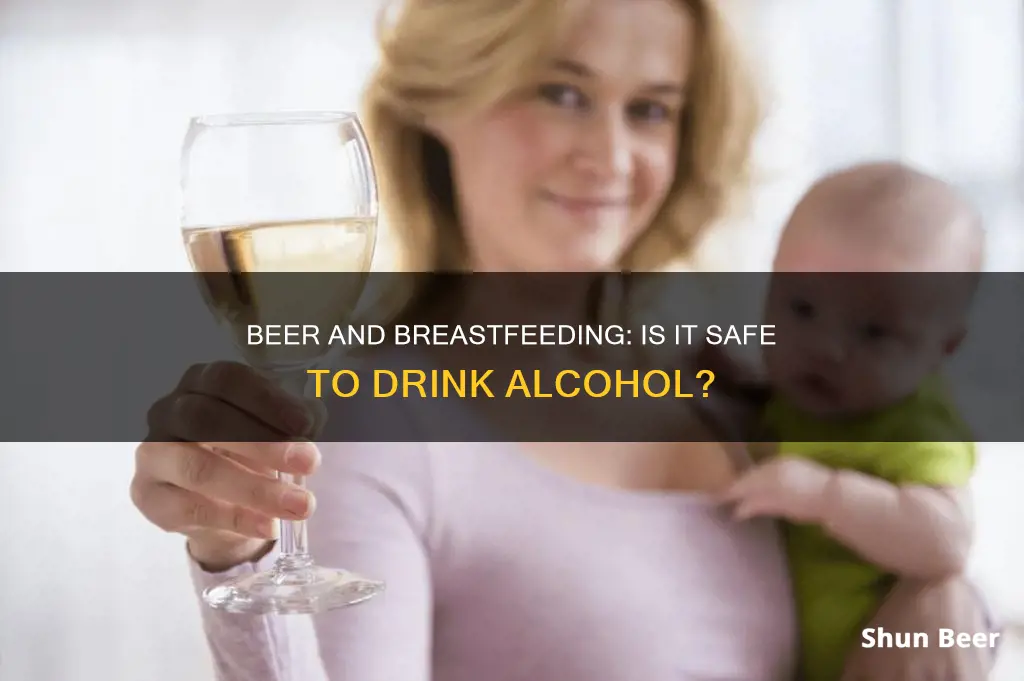
Breastfeeding and alcohol consumption bring up a lot of questions for many new parents. While abstaining from alcohol is the safest option, an occasional drink is okay, and you can safely nurse your baby after the alcohol has left your breast milk. The key is to plan in advance, understand your body, and drink responsibly.
It takes about two hours for the average adult to metabolize one drink. This means that if there's still alcohol in your system, there's still alcohol in your breast milk. You should not nurse until you feel neurologically normal — your everyday self, not at all tipsy or buzzed.
According to the Dietary Guidelines for Americans, one standard drink is 12 oz. of 5% ABV beer (about one can). However, it's important to note that ABV (alcohol by volume) can vary, so a 12-ounce glass of 9% ABV beer is like having two drinks.
If you're a casual drinker who has a beer once or twice a week, there's probably no reason to pump and dump. Instead, wait several hours after drinking alcohol before breastfeeding or pumping. Pumping and dumping won't remove the alcohol from your bloodstream or breast milk.
While drinking only one standard glass of alcohol a day hasn't been proven harmful to infants, higher levels of drinking can interfere with let-down and reduce your milk supply. Studies have shown that alcohol can affect the balance of hormones that control breast milk production (prolactin and oxytocin).
So, it is possible to have a drink while breastfeeding, but remember to do so in moderation!
| Characteristics | Values |
|---|---|
| Can I drink beer while breastfeeding? | Drinking small amounts of alcohol while breastfeeding is unlikely to harm your baby. However, drinking in moderation (i.e. one standard glass of alcohol) while breastfeeding is likely fine, but more research is needed. |
| How long should I wait after drinking alcohol to breastfeed? | It takes about two hours for the average adult to metabolize one drink. It is recommended to wait 2 hours after consuming a 12-ounce beer to breastfeed. If you drink more than one beer, wait 2 additional hours for each additional drink. |
| Should I pump and dump? | Pumping and dumping does not remove alcohol from breast milk. It is only recommended if you are uncomfortable and need to express to relieve the discomfort. |
| How does drinking alcohol affect my breastfed baby? | Drinking alcohol occasionally has been shown to have minor short-term effects on your baby's behaviour. Some babies experience increased awake times and are more irritable. |
| Will drinking alcohol alter my milk supply? | Studies have shown that alcohol can affect the balance of hormones that control breast milk production (prolactin and oxytocin) and can reduce your supply. |
What You'll Learn

How long after drinking beer is it safe to breastfeed?
While it is recommended to abstain from drinking alcohol while breastfeeding, one standard drink per day is generally considered okay. The time it takes for alcohol to leave your breast milk depends on several factors, including:
- The amount of alcohol consumed
- How quickly the alcohol was consumed
- Whether the alcohol was consumed with food or on an empty stomach
- How much you weigh, and how fast your body can metabolise and break down alcohol
Most medical authorities, including the American Academy of Pediatrics (AAP) and the Centers for Disease Control and Prevention (CDC), recommend waiting to nurse at least two hours after your last drink. This is because alcohol peaks in breast milk anywhere from 30 to 60 minutes after drinking, and the highest alcohol levels in milk occur 30 to 60 minutes after an alcoholic beverage, although food delays the time of peak milk alcohol levels.
According to the CDC, alcohol from one drink can be detected in breast milk for about two to three hours, and the time period extends to about four to five hours if a mother consumes two drinks, and to about six to eight hours if she consumes three drinks, and so on. Therefore, if you have one drink, it is recommended to wait at least two hours before breastfeeding. If you have two drinks, it is recommended to wait at least four hours, and if you have three drinks, it is recommended to wait at least six hours, and so on.
It is important to note that these are generalised guidelines, and the time it takes for alcohol to leave your breast milk will vary depending on individual factors. It is also important to consider the potential risks of exposing your baby to alcohol through breast milk, as it can cause sleep, growth and developmental problems.
Beer and Leg Pain: Is There a Link?
You may want to see also

Does alcohol affect breast milk production?
There is a common misconception that drinking alcohol, especially beer, while breastfeeding can help boost milk production. While it is true that a barley component in beer boosts prolactin production, which in turn stimulates breast milk production, alcohol on its own decreases milk production.
Alcohol is a potent inhibitor of oxytocin, a hormone that stimulates milk ejection. In a nursing mother, the release of oxytocin associated with alcohol ingestion stimulates milk ejection, which may decrease the amount of milk available to the nursing infant. The higher the alcohol intake, the greater the effect; one study noted that drinking as little as 0.3 g of alcohol per kg (which is less than the amount considered acceptable by the American Academy of Pediatrics) reduced milk production by about 10%.
Research has shown that infants breastfed by women who had consumed alcohol prior to nursing consumed approximately 20% less milk in the first 4 hours after maternal alcohol consumption than women who did not drink. However, if mothers did not consume any more alcohol, babies breastfed more frequently and consumed larger amounts of milk in the 8 to 12 hours after maternal alcohol consumption.
Current evidence shows that, rather than producing more milk for your baby by drinking alcohol, the effects of alcohol on your body mean that your baby will get less of your valuable milk.
Recommendations
- Breastfeed your baby immediately before drinking any alcoholic beverage, if possible, or pump and save your milk.
- Limit your alcohol intake to one or two glasses of wine (8 ounces total) or one or two beers.
- Wait at least 2 hours after drinking one standard drink before breastfeeding your baby.
- If your baby needs to be nursed before two hours is up, use your previously expressed milk to feed your baby.
Drinking Beer on TV: Is It Allowed?
You may want to see also

What are the short-term effects of alcohol on a nursing infant?
It is important to note that alcohol passes into breast milk and then into the baby when they feed. While an occasional drink is unlikely to harm the baby, especially if feeding is avoided for at least two hours after drinking, regular drinking above the recommended limits can be harmful to both mother and baby.
- Increased REM sleep in the period from 3.5 hours to 24 hours after exposure to alcohol.
- Decreased milk intake by the baby.
- Decreased weight gain.
- Sleep disturbances, including shorter sleep periods, more frequent wakefulness, and less total active and REM sleep in the three-hour period after the mother consumes alcohol.
- Impaired immune function.
- Delayed motor development.
- Potential impairment of cognitive development.
- Reduction in the ability for abstract reasoning at school age (6-7 years).
Beer and Periods: A Healthy Mix?
You may want to see also

What are the long-term effects of alcohol on a nursing infant?
While there is limited information on the long-term effects of alcohol on a nursing infant, there are a few studies that have been conducted to investigate this. One study of 400 infants found that maternal alcohol consumption while breastfeeding was associated with lower scores on the Psychomotor Development Index (PDI), indicating delayed motor development. This association remained significant even after controlling for various confounding factors. Another study from the same group, however, found no association between alcohol exposure and developmental scores in 18-month-old children.
In another study, data from the Growing Up in Australia longitudinal study was analysed, and it was found that heavier maternal alcohol consumption during breastfeeding was associated with reductions in abstract reasoning abilities at ages 6 to 7 years in the children who had been breastfed. This association was not observed in infants who had never been breastfed, suggesting that the reductions in cognitive functioning were related to exposure to alcohol through breastmilk.
These studies suggest that there may be potential long-term effects of alcohol exposure through breastmilk on neurodevelopmental outcomes, including motor development and cognitive functioning. However, more research is needed to confirm these findings and understand the full range of potential long-term effects.
It is important to note that the effects of alcohol on a nursing infant may also be influenced by other factors, such as the mother's behaviour and capacity to parent, as well as genetic, psychosocial, cultural, and economic factors. Therefore, it is essential for breastfeeding mothers to receive accurate and up-to-date information about the potential risks of alcohol consumption while breastfeeding.
Lip Fillers and Beer: What's Safe to Drink?
You may want to see also

What are the risks of drinking alcohol while breastfeeding?
While drinking a beer or two while breastfeeding is unlikely to harm your baby, there are still risks to be aware of.
Firstly, it's important to know that alcohol does pass into your breast milk. The highest levels of alcohol in breast milk are typically found 30 to 60 minutes after drinking, and the more you drink, the longer it takes for the alcohol to clear your system. For example, alcohol from one drink can be detected in breast milk for about two to three hours, but this time period extends to about four to five hours if you consume two drinks, and so on. So, if you're planning on drinking, it's best to feed your baby beforehand or express and store milk for their next feed.
Secondly, while moderate alcohol consumption (one to two drinks per day) is unlikely to affect your milk supply, regular or heavy drinking can negatively impact your let-down reflex and reduce your overall milk supply. This means that your baby may not be getting as much milk as they need, which could lead to slow weight gain or failure to thrive.
Thirdly, drinking alcohol while breastfeeding can also affect your baby's sleep patterns and development. Studies have shown that infants breastfed by mothers who had consumed alcohol prior to nursing consumed approximately 20% less milk in the first four hours and experienced more fragmented sleep. There is also some evidence to suggest that regular exposure to alcohol in breast milk may have long-term effects on a child's cognitive development, including their ability for abstract reasoning at school age.
Finally, it's crucial to consider the impact of alcohol on your ability to care for your baby safely. Drinking alcohol can reduce your awareness of your baby's needs and impair your natural reflexes, so it's important to never sleep with your baby if you've been drinking.
In summary, while an occasional beer or two is unlikely to harm your baby, regular or heavy drinking while breastfeeding can have negative consequences for both you and your baby. To minimise the risks, it's important to drink in moderation, plan ahead, and ensure that safe sleeping arrangements are in place.
Sinusitis Sufferer's Guide: Beer Drinking Days Are Over
You may want to see also
Frequently asked questions
It takes around two hours for the average adult to metabolize one drink. It's recommended to wait at least two hours after drinking one 12-ounce beer before breastfeeding. If you've had two drinks, wait four to five hours.
Studies have shown that babies breastfed by women who had consumed alcohol prior to nursing consumed approximately 20% less milk in the first four hours after maternal alcohol consumption. Alcohol can also affect your baby's sleep patterns, causing increased REM sleep and more frequent wakefulness.
There may be potential long-term effects on your baby's development, particularly from greater exposure to alcohol in breast milk. A 2018 study showed that 6- and 7-year-old children who had consumed breast milk with alcohol in it as babies scored lower on reasoning tests than other children their age who hadn't been exposed to alcohol in their milk.







